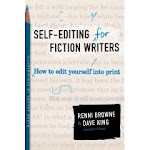- First, quit putting it off. Make a commitment to spend a certain amount of time in front of the computer – writing – and do it. Sound hard? Of course it is, otherwise everyone would be a writer.
- Begin by writing what you’re afraid of. Fear of failure? Write why it matters. Fear of inadequacy? Define it. You’ll find that it looks small and a little silly when you actually write it down.
- Next, remember how you got here. Recognition in the writing world comes (99.9% of the time) from putting in time. It comes from being willing to let others see your work and getting back at it after rejection. Give yourself some credit – you’re obviously not a wimp, or you wouldn’t be trying to become a writer.
- Finally, give yourself permission to try and fail. Just because this one project doesn’t work out doesn’t mean you’re not a writer. I would say the contrary is true. If everything you’ve tried, succeeded, maybe you’re not trying much.
Monday, January 31, 2011
Paralyzing Fear
Sunday, January 23, 2011
MARKETING NOVELLAS
Recently there have been several questions on the ACFW loop regarding writing and selling novellas. Today I am going to discuss marketing novellas.
Recently Barbour (my publisher) created quite a stir by announcing that in 2012 they will be releasing a total of 26 novella collections—13 historical, 13 contemporary, for a whopping total of 104 novellas. They are already awarding contracts, so the competition is on!
Steeple Hill (publisher of 2010 Carol award winner for historical novella), Tyndale House (publisher of 2010 Carol award winner for contemporary novella) and White Rose Publishing also publish novellas. There may be others, but I’m not certain.
Since my experience is with Barbour (four novellas), I will speak to their process. The steps are fairly simple:
1. Decide whether you want a contemporary or historical setting.
2. Assemble a team. This must include at least two established Barbour authors (and three is better).
3. Choose a geographical setting and a theme. Consider the following titles of the Christmas novellas from this year, that give you both in a few words:
- Christmas Mail-Order Brides: Four Mail-Order Brides Travel the Transcontinental Railroad in Search of Love
- A Door County Christmas: Four Romances Warm Hearts in Wisconsin's Version of Cape Cod
- A Riverwalk Christmas: Four Couples Find Love in Romantic San Antonio
- A Woodland Christmas: Four Couples Find Love in the Piney Woods of East Texas
4. Prepare the proposal. Elements will include: (Hint: Becky prefers single space.)
- Blurb summarizing anthology
- Blurbs summarizing each of the four novellas
- Bible verse for each novella
- Synopsis for each novella (1 page preferred)
- First chapter for authors not previously published with Barbour
- Author bios
5. Choose one person to submit the proposal to editor Becky Germany. . .and prepare to wait. She generally will contract the manuscript six months prior to the manuscript due date.
Although the process is fairly simply, I have noticed some common mistakes from non-Barbour authors:
1. Send a proposal for a single novella—proposals must be made for the anthology as a whole.
2. A group submits a proposal without the required two-three Barbour authors.
3. The novella reads more like women’s fiction than romance (this gets into how to write a novella, a topic I will address later if there is interest.)
4. The story deals with a topic too complex for the novella format.
Check out the December 16th post at editcafe.blogspot.com for more on Barbour’s requirements.
Sunday, January 16, 2011
The Importance of a Name - Why We Need to Get it Right
- Write it Down – I keep a scratch pad next to my computer and I always write down the name of the person I’m referring to. Writing it in longhand somehow helps engage my brain and acts as a way to double check my accuracy.
- Check the Gender – so many names can be either masculine or feminine. Most websites and blogs have pictures (Centered Magazine had pictures of everyone on staff making it easy to see that I’m a woman) so I try to check that way. If it’s a blog and there’s no picture, I look at previous comments to see how most people have referred to the person – male or female.
- Add to My Contacts – if I’m going to make a comment on someone’s blog or query an editor, I add them to my contacts list. This helps me find them again without searching the Internet and it gives me another way to double check their name.
Sunday, January 9, 2011
HAPPY NEW YEAR!
For the new year, I talked about goal setting. Still important. This year finds me in a different place. I need inspiration. Do you feel the same way? Or did the calendar page turn find you eager to start anew?
Here are some of the places I've found inspiration during this season of struggle and self-doubt:
- Friends. One friend wisely pointed that I have entered a new stage in my writing career, and of course I should expect problems with adjustment, but that it would come. Wow! I'm perfectly normal.
- Rest. I've been sick for four weeks with the same cold/intestinal bug that is bothering a lot of people this winter. So I've gone to the doctor, taken my medicine, rested extra and tried to take care of myself.
- God's Word. From the challenge in Proverbs to live a disciplined line to the promise in 1 Corinthians that God has affirmed the gifts of speaking and knowledge within me, God gives me that little bit of encouragement and challenge I need every day.
- Tune out. After a week of "playing" on the computer instead of writing, I decided to do something drastic. I left the computer off until the evening and wrote everything longhand. It worked!
- Family. I spent a wonderful evening with my engaging toddler granddaughter Jordan, once again seeing the world through her eyes.
- Deadlines. A powerful motivator to fix the problem.
What are some things you need to renew and renergize when life gets you down?
Sunday, January 2, 2011
Clichés—Out With the Old, In With the New
- Clichés keep you from growing as a writer—if it’s worth doing, it’s worth doing right.
- Clichés encourage the reader to miss what you’re saying—after all, familiarity breeds contempt.
- Clichés are the mark of a lazy writer—only writers who keep their noses to the grindstone will succeed in this dog eat dog business.
- Saying something in a new way gives your writing depth—in this day and time a successful writer is one who can stand out above the rank and file.
- It keeps your readers interested by keeping them guessing—no writer wants a reader as an armchair quarterback.
- Finding a new way to describe something keeps your writing muscles toned—no guts, no glory.
Now I’ll cut to the chase. I challenge you to guess how many clichés are found in this post. So knuckle down and force yourself to reread this labor of love and mark my words. No, really—mark my words—make a list and check it twice and leave a comment with your best guess of how many clichés I've used.











